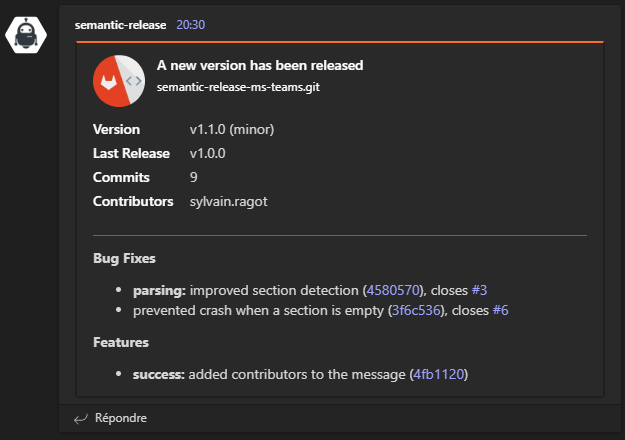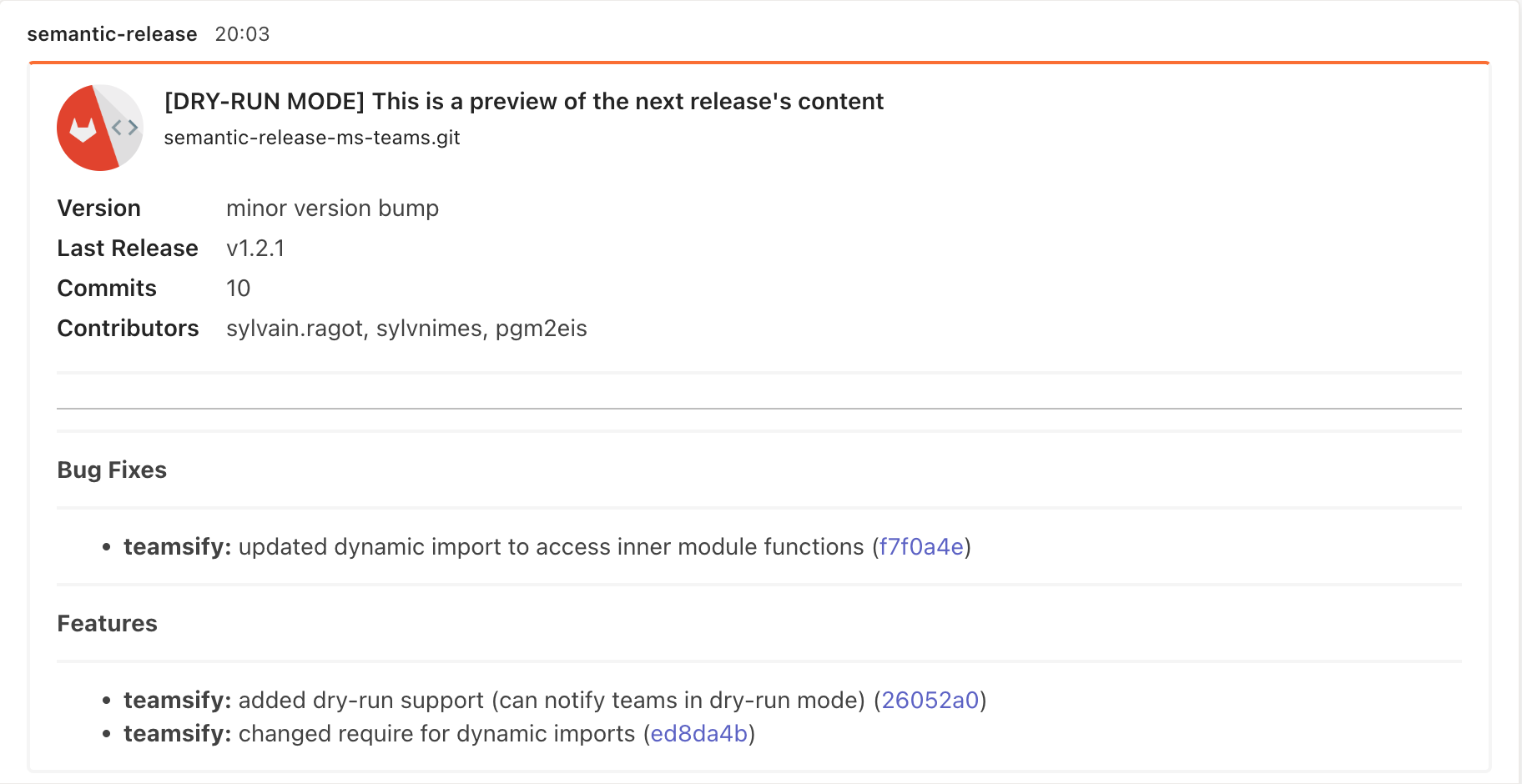semantic-release-ms-teams-proxy v2.1.1
semantic-release-ms-teams
semantic-release plugin to send release notes to a teams channel when the release succeeds.
| Step | Description |
|---|---|
verifyConditions | Check the webhookUrl option or TEAMS_WEBHOOK_URL variable. |
generateNotes | Allow sending release note to MS Teams in dry-run mode. |
success | Send a Teams message to notify of a new release. |
Installation
npm install semantic-release-ms-teams --save-dev
# or
yarn add semantic-release-ms-teams --devThis plugin is using an incoming webhook to notify a teams channel. Here is some documentation to create one.
Usage
// .releaserc.json
{
"branches": ["main"],
"plugins": [
"@semantic-release/commit-analyzer",
"@semantic-release/release-notes-generator",
["semantic-release-ms-teams", {
"webhookUrl": "...",
"proxyUrl": "...",
"title": "A new version has been released",
"imageUrl": "http://...",
"showContributors": false,
"notifyInDryRun": true
}]
]
}| Variable | Details | Description |
|---|---|---|
webhookUrl or TEAMS_WEBHOOK_URL | required, url | The incoming webhook url of the channel to publish release notes to. |
webhookUrlDryRun or TEAMS_WEBHOOK_URL_DRYRUN | optional, url | Similar to webhookUrl or TEAMS_WEBHOOK_URL, but will be used in dryRun mode. Default: webhookUrl or TEAMS_WEBHOOK_URL |
proxyUrl in ENV: PROXY_URL, http_proxy or https_proxy | optional, text | The URL of a proxy the teams-request has to go through. Useful for business people |
title | optional, text | The title of the message. Default: A new version has been released |
imageUrl | optional, url | An image displayed in the message, next to the title. The image must be less than 200x200. |
showContributors | optional, boolean | Whether or not the contributors should be displayed in the message. Default: true |
notifyInDryRun | optional, boolean | Whether or not the release notes will be send to Teams when semantic-release runs in dry-run mode. Default: true |
Notes
webhookUrlandproxyUrlare properties of the config object in.releaserc.json, and,TEAMS_WEBHOOK_URL,PROXY_URL,http_proxyandhttps_proxyare environment variables. The config object can be useful to try the plugin, but most of the time, production environments prefers environment variables. You can use both, but not in the same time as it does not make sense. If you do define both, the config object overrides the environment variable.IMPORTANT: The
webhookUrlandproxyUrlvariable you can use within your plugin configuration is meant to be used only for test purposes. Because you don't want to publicly publish these url and do let the world know a way to send messages to your teams channel, you will want to use theTEAMS_WEBHOOK_URL/PROXY_URLinstead.When in dry-run mode, here are the order of considered urls:
webhookUrlDryRun,TEAMS_WEBHOOK_URL_DRY_RUN,webhookUrl,TEAMS_WEBHOOK_URLThe default value for
imageUrlis https://upload.wikimedia.org/wikipedia/commons/thumb/4/4e/Gitlab_meaningful_logo.svg/144px-Gitlab_meaningful_logo.svg.pngThe list of Contributors is built using the email associated with the commits (only the part before the "@" is kept). This list can be disabled (mainly for privacy reasons).
The official
@semantic-release/gitplugin may cause a second message to be sent (because the plugin potentially adds a commit on the current branch, to save changes in files likepackage.json,package-lock.json,CHANGELOG.md). In order to prevent that, an environment variable (HAS_PREVIOUS_SEM_REL_EXECUTION) is set totrueafter the first message, then this plugin won't send any other message, as long as the plugin is part of the config.
Screenshots


Development
Here are some steps to test the plugin locally:
- checkout the source code:
git clone git@gitlab-ncsa.ubisoft.org:sragot/semantic-release-ms-teams.git cd semantic-release-ms-teams npm install - create a personal access token in github, then
export GH_TOKEN=... - run
semantic-releaselocally safely:npm link npm link semantic-release-ms-teams npm run release -- --dry-run --no-ci
Dependencies
remark: Markdown to JSONmdast-util-to-markdown: JSON to Markdownnode-fetch-commonjs: As fetch isn't in NodeJS 16, and semantic-release doesn't support ES modules. These 2 assertions are subject to evolutions.https-proxy-agent: Send the message over a proxy
Greatly inspired by semantic-release-slack-bot ... Thanks ;)